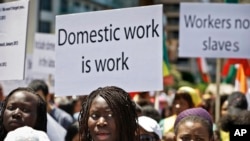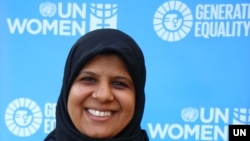March 8 is a day set aside by the United Nations to recognize the contributions of women to the social, economic, cultural and political achievements around the world.
The United Nations Entity for Gender Equality and the Empowerment of Women, also known commonly as UN Women, is using the day to draw the world’s attention to unpaid care work by women. Mehjabeen Alarakhia, UN Women's regional advisor on Women’s Economic Empowerment for East and southern Africa, told VOA from Nairobi that for the theme of this year’s celebration —"Invest in women, accelerate progress" — to translate into the everyday lives of women, it is imperative to address the imbalances.
"In Africa, women spend three to four times more time on unpaid care and domestic work compared to their male counterparts. This means that over the course of a day, if she were to work full time, she would spend eight hours at work, spend four hours at home doing unpaid care and domestic work and then doing other things."
She said overall, the phenomenon renders women with less time to take on other activities — "whether it’s productive economic activities, leadership activities, social or even leisure like taking a nap or education — because they are using that time to provide these services." This is unequal, the UN Women senior official observed.
Alarakhia recommends increased investments in policies that would help reduce unpaid care work by women. "For example," she said, "(fixing) rural water infrastructure in Africa to reduce the amount of time that women have to walk to fetch water for their households." She noted that in some places, it takes as much as two hours per day to complete the task.
The UN Women senior official also said the number of women and girls affected by violence has soared in conflict-ridden areas around the world, citing insecurity in the Democratic Republic of Congo, Sudan as well as the war in Gaza, Ukraine and Afghanistan.
"The world is at a crucial crossroads for gender equality. We are in a world where we have increase in conflict. We see the change in climate, we see a lot more polarization in society, and standing up for women’s rights is more important than ever," Alarakhia said.
However, she noted the focus should be geared toward honoring the resilient contributions of women to society despite the odds they face particularly those in conflict-prone regions.
"We see limited services in healthcare, water, sanitation, among others. But women are the ones who come into play to ensure that those limited services are still being provided for their families and households. So, there’s a very strong role that women play across the board, and that’s what we want to celebrate."
Shupikai Gwabuya is the focal person on women, human rights defenders at CIVICUS, a global civil society alliance with offices in Zimbabwe. She told VOA from Harare that there has been increased participation of women in civic spaces on the continent, thereby drawing the world’s attention to some of Africa’s disturbing occurrences like the Sudan conflict. She mentioned as an example a local group — ‘Sudanese Women's Rights Action’ — a group of Sudanese activists working to amplify the human rights of Sudanese women.
"I have been working with women in the diaspora that focus on the Sudan conflict in particular. They (Sudanese Women's Rights Action) have held several webinars just to discuss, one, to make people aware of the situation on the ground and, two, to mobilize more support and humanitarian support from Sudanese citizens who are in the diaspora," she said.
"These are women," she explained, " like doctors, human rights experts, economists, who have come together to advocate on the Sudan situation."
In Africa, a recent UN Women report indicates that over 342 million women and girls are likely to be living in extreme poverty by 2030, if current trends – geopolitical conflicts, soaring poverty levels and climate change – continue. Gwabuya said she believes that investments into women's leadership will help improve their political and economic participation, thus forestalling the prediction.
"Also," she exclaims, "advocacy for policy reforms that truly encapsulate women's issues without assumptions, but being evidence-based are some of the interventions that are imperative."













Forum